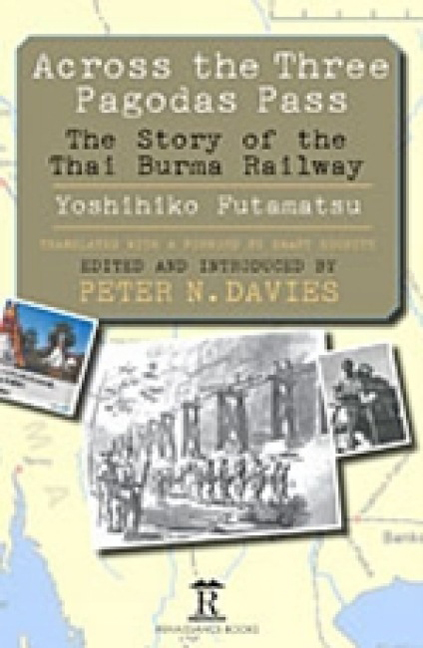Book contents
- Frontmatter
- Dedication
- Contents
- Acknowledgements
- Foreword
- Introduction
- Across the Three Pagodas Pass
- Translator’s Acknowledgements
- Preface
- Chapter 1 Departure for the Front
- Chapter 2 In Indo-China
- Chapter 3 Opening of Hostilities
- Chapter 4 The River Krian
- Chapter 5 The Malayan Campaign
- Chapter 6 The Fall of Singapore
- Chapter 7 Surrender
- Chapter 8 Shōnan: Light of the South
- Chapter 9 The Thai-Burma Railway
- Chapter 10 Preparing Construction
- Chapter 11 Banpong
- Chapter 12 Prisoners-of-War
- Chapter 13 Constructing the Railway
- Chapter 14 Thailand
- Chapter 15 The River Kwae Noi
- Chapter 16 The Mae Khlaung Bridge
- Chapter 17 Kanchanaburi
- Chapter 18 The Jungle
- Chapter 19 From Bangkok to Singapore
- Chapter 20 Rush Construction
- Chapter 21 The Base at Wanyai
- Chapter 22 The Labour Force
- Chapter 23 Survey Unit
- Chapter 24 Test Run
- Chapter 25 Bridge-Building and Shifting Earth
- Chapter 26 The Rainy Season: The Monsoon
- Chapter 27 Kinsaiyok
- Chapter 28 Diseases and Epidemics
- Chapter 29 Cattle Drive
- Chapter 30 Living in the Jungle
- Chapter 31 Soon to the Three Pagodas Pass
- Chapter 32 Towards the Setting Sun
- Chapter 33 Opening to Traffic
- Chapter 34 The Bombing
- Chapter 35 End of the War
- Chapter 36 Internment
- Chapter 37 Repatriation
- Footnote
- Postscript
- End Notes
- Glossary
- Bibliography
- Index
Chapter 12 - Prisoners-of-War
Published online by Cambridge University Press: 13 May 2022
- Frontmatter
- Dedication
- Contents
- Acknowledgements
- Foreword
- Introduction
- Across the Three Pagodas Pass
- Translator’s Acknowledgements
- Preface
- Chapter 1 Departure for the Front
- Chapter 2 In Indo-China
- Chapter 3 Opening of Hostilities
- Chapter 4 The River Krian
- Chapter 5 The Malayan Campaign
- Chapter 6 The Fall of Singapore
- Chapter 7 Surrender
- Chapter 8 Shōnan: Light of the South
- Chapter 9 The Thai-Burma Railway
- Chapter 10 Preparing Construction
- Chapter 11 Banpong
- Chapter 12 Prisoners-of-War
- Chapter 13 Constructing the Railway
- Chapter 14 Thailand
- Chapter 15 The River Kwae Noi
- Chapter 16 The Mae Khlaung Bridge
- Chapter 17 Kanchanaburi
- Chapter 18 The Jungle
- Chapter 19 From Bangkok to Singapore
- Chapter 20 Rush Construction
- Chapter 21 The Base at Wanyai
- Chapter 22 The Labour Force
- Chapter 23 Survey Unit
- Chapter 24 Test Run
- Chapter 25 Bridge-Building and Shifting Earth
- Chapter 26 The Rainy Season: The Monsoon
- Chapter 27 Kinsaiyok
- Chapter 28 Diseases and Epidemics
- Chapter 29 Cattle Drive
- Chapter 30 Living in the Jungle
- Chapter 31 Soon to the Three Pagodas Pass
- Chapter 32 Towards the Setting Sun
- Chapter 33 Opening to Traffic
- Chapter 34 The Bombing
- Chapter 35 End of the War
- Chapter 36 Internment
- Chapter 37 Repatriation
- Footnote
- Postscript
- End Notes
- Glossary
- Bibliography
- Index
Summary
In war, when enemy forces are in action, their troops who surrender and become captives in general gain by it. Among all countries in the world who approved it the later International Convention concerning Prisoners-of War was ratified in Geneva. Japan's position in regard to the Convention was that our military declined responsibility for prisoners-of-war, and when war broke out in 1941 Japan had not ratified or signed the Convention. However, in Japan's case in the past in the Sino-Japanese War and the Russo-Japanese War our troops had taken prisoners, and so it was expected by other countries that in this war, too, Allied Forces’ troops would become captives in the same way.
Japan excepted, foreign countries’ military in their organizational systems did not have many people who became volunteer soldiers and in battle could become prisoners-of-war properly so-called and they came under the provision of the International Prisoners-of War Convention as regards their treatment: captives themselves well knew about this Convention and under it would expect certain standards of treatment. They saw nothing dishonourable in this, and it was evident that they did their tasks faithfully. In England's case, it is the custom for the King to send repatriated prisoners-of-war a letter of appreciation individually, as former prisoners-of-war when I met them openly avowed.
By contrast, in our country's military systems set-up, soldiers were brought up in the spirit of public duty to die, and on the battlefield this rule of conduct was observed to the letter, embracing our country's demand to dedicate one's life to her, a command strictly enforced … ‘If captured one must not incur the shame of going on living.’ If soldiers by any chance unexpectedly became prisoners, they were disgraced for the rest of their lives. Because Japanese soldiers felt like this, they could properly call into contempt enemy soldiers for not being ashamed of cowardice. When foreign soldiers became prisoners-of war in battle and come under their enemy's protection, they know they can take a rest from battle, but if the opportunity arises can escape.
- Type
- Chapter
- Information
- Across the Three Pagodas PassThe Story of the Thai-Burma Railway, pp. 51 - 60Publisher: Amsterdam University PressPrint publication year: 2013

